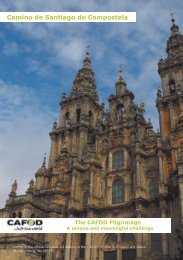Religious Education Curriculum Directory (3-19) - The Catholic ...
Religious Education Curriculum Directory (3-19) - The Catholic ...
Religious Education Curriculum Directory (3-19) - The Catholic ...
- No tags were found...
You also want an ePaper? Increase the reach of your titles
YUMPU automatically turns print PDFs into web optimized ePapers that Google loves.
<strong>Catholic</strong> Bishops’ Conference of England and Wales — Department of <strong>Catholic</strong> <strong>Education</strong> and FormationContent According to Age GroupsAge Group Statement Notes<strong>The</strong> Areas of Study are closely interrelated and the organic unity of each is important. Teachingand learning strategies will provide continuity and progression. <strong>The</strong> following Age Group Statementsare offered as examples of appropriate provision. <strong>The</strong>y do not constitute a prescriptivecurriculum.Where examples are given, they indicate intent and direction. <strong>The</strong>y are neither minimal nor exhaustive.<strong>The</strong> statements are addressed to teachers and advisors who will ensure that in the classroomthere will be:• a supportive environment for learning;• a repertoire of approaches and resources which take account of the different communicationmodes, experience and ability of all pupils;• differentiation;• a variety of approaches and resources which respond to the range of different learning needsand abilities;Please note that for each Area of Study there are driver words that are used in the levels of attainmentthat are broadly appropriate for each age group and focus teaching and learning strategies.Where pupils are operating within P levels it may be necessary to replace the driver words with‘experience’ and ‘respond’ (see diagram on p.68).Provision for Under Fives (Nursery)<strong>The</strong> Foundation Phase describes the stage of a child’s education from the age of 3 to the endof reception at the age of 5 (or age 3 to 7 in Wales). In <strong>Catholic</strong> schools <strong>Religious</strong> <strong>Education</strong>will form a valuable part of the educational experience of pupils throughout this stage.Through engaging, practical and integrated activities, children can learn more about themselves,other people and the world around them and develop their religious knowledge, skills and understanding.<strong>Religious</strong> <strong>Education</strong> makes an active contribution to the areas of learning outlined in thecurriculum for children of this age but makes a particularly important contribution to:• Personal, social and emotional development• Communication, language and literacy• Knowledge and understanding of the world• Creative developmentWithin what is a highly-integrated curriculum, teachers of children of this age will seek to:• deliver a <strong>Religious</strong> <strong>Education</strong> programme which meets the needs of all children;• make provision for the spiritual, moral, social and cultural development of their pupils within a<strong>Catholic</strong> context;• build upon and extend <strong>Religious</strong> <strong>Education</strong> begun in the home;• work in active partnership with home and parish, preparing pupils for more formal <strong>Religious</strong><strong>Education</strong> in later years.53
















